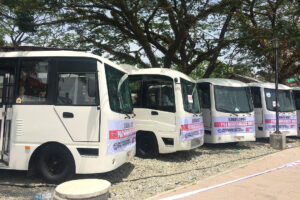THE Automotive Body Manufacturers Association of the Philippines (ABMAP) said it supports the Department of Transportation’s (DoTr) decision to go forward with modernizing the jeepney fleet, citing the need to improve safety and air quality.
“We commend Secretary (Vivencio B.) Dizon’s commitment to moving forward with modernization. The transition to Euro 4-compliant vehicles is a necessary step to ensure road safety, reliability, and improved air quality,” ABMAP Executive Director Edgar Manuel.
The DoTr, under Mr. Dizon, its new Secretary, has decided to proceed with the Public Transport Modernization Program (PTMP), but cited the need to resolve snags like vehicle financing and route rationalization.
“Our members are ready to support operators and cooperatives in acquiring modern, high-quality vehicles that meet global standards,” Mr. Manuel added.
Mr. Dizon has said that the program has achieved an 86% consolidation rate under former Transportation Secretary Jaime J. Bautista, the process by which smaller operators are combined to make them more viable entities in terms of acquiring and operating modern jeepneys.
“We need to understand the issues very well. Masalimuot ang mga issues (the issues are complex), hindi lang naman ’yan simpleng pagpapalit ng mga sasakyan (it’s not as simple as replacing the vehicles),” Mr. Dizon said on the sidelines of the turnover of DoTr leadership on Monday.
Introduced by the DoTr in 2017, the PTMP requires public utility vehicles (PUVs) to meet emission standards and form cooperatives to facilitate efficient fleet management.
“ABMAP believes this initiative will provide long-term benefits for drivers, passengers, and the transport industry as a whole,” Mr. Manuel said.
“We understand the concerns of some stakeholders, but modernization is not about eliminating traditional jeepneys — it’s about improving them. We need a transport system that ensures a better commuting experience for all Filipinos,” he added.
ABMAP has said that the issues regarding financing and vehicle selection can be “resolved through constructive dialogue and collaboration.”
It added that the focus must be on refining the program’s guidelines, expanding financing options, and ensuring a smoother transition, and not on suspending the program. — Justine Irish D. Tabile

